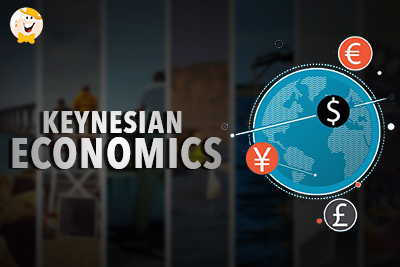
One of the single most common conceptions with respect to Advantage Players is that the do not contribute in a positive way to the economy, but I am in the position to argue that said viewpoint is fundamentally incorrect. I think my back is going to feel good by the end of this Editorial because I am about to take a long stretch here by way of suggesting that Advantage Players contribute more positively to the overall economy than the casinos would in the event that there were a lack of Advantage Players. While most people would argue, ‘Advantage Players are not engaging in anything that contributes to the general welfare of others, whereas, people in other positions do,’ I would tend to disagree.
The first thing that people must consider about the relationship between the advantage player and the casino, with respect to Keynesian Economics, is the fact that the Advantage Player who makes money in the casino is going to contribute more to the Base Economy than other people. For one thing, the Advantage Player needs to purchase Base Goods such as food, beverages and clothing, whereas, if that money were in the casino’s coffers in the form of profits, it would not directly go to any of that.
The principles of Keynesian Economics are such that the maximum utility of a currency is realized when that currency is constantly recycled through the economy in the form of Base Goods. In other words, as a fundamental Economic Principle, currency is best served when it is circulated through the economy with as great a frequency as possible, rather than locked up in profits that only have the potential to be utilized rather than being absolutely actually utilized.
What that means is that all of the money that is tipped to low-level casino employees such as cocktail waitresses getting tips that will immediately be spent on Base Goods to slot attendants receiving tips that will, also, immediately be spent on Base Goods is more of an economic mover than money that sits and does nothing in the form of profits.
Furthermore, even in the event that the casinos themselves were to invest in something, such investments would not be more immediate on the monies that they earned than the immediate Economic Investments that are transacted by Advantage Players. In that sense, they are working a job just like anybody else and a greater portion of the money that they make, at least in comparison to casinos, is being utilized on the Base Goods that are necessary to sustain themselves.

In other words, the casinos are not going to be purchasing more fundamental base goods, such as food, shelter and clothing on direct than those purchased by the Advantage Players that turn profits in the casinos. In that sense, it is a true, ‘Rob from the rich to give to the poor,’ situation with the exception being that they are not actually robbing anything from anyone. The simple fact of the matter is that Advantage Players, who themselves are on a lower Socio-Economic platform than the casinos themselves, will contribute more to the lower Socio-Economic levels of the Economy.
Some people might argue that, ‘Casinos have the potentiality to invest,’ and that argument is true to such extent that they may intend to build new properties or make improvements to existing properties, but when on is fully sustained by way of Advantage Play, the cycling of currency and purchasing of Base Goods is no different than it would be with any other job.
Furthermore, Advantage Players may act as a source of temporary employment for many other people. In the vast majority of cases, these people will occupy a lower position on the overall Socio-Economic ladder to such extent that any monies made by these people are extremely likely to be contributed to Base Goods, much as with anyone working a low-level job. However, in the event that all of these profits remained with the casino, there is nothing that would necessarily indicate that they would contribute more money to paying employees as a result.
In fact, it could even be argued that Advantage Players result in the necessity for the casino to pay additional staff. They are certainly in the casino, so as a result, they are contributing to the need for cocktail waitresses and other floor staff. While the money needed for these employees obviously does not come directly from the AP’s, there is no doubt that any additional people in the casino, regardless of whether or not the casinos are making money as a result of the AP’s being there, contribute to the need for the casino to have sufficient staff to provide for these people.
In other words, prior to the point that these AP’s start taking money out of the casinos, they are essentially treated like any other customer and necessary staffing levels may be adjusted accordingly.

However, the real rub is after the AP has left the casino, the AP may either have a house payment or rent that must be addressed, and as a result, monies will go to that which the casino would not be directly paying for. Groceries must be bought, or food at a restaurant, which results in profits for the grocer of restaurateur, which, once again, the casinos would not be directly paying for. One could go even further than that to look at such things as utilities, fuel, oil changes and any other regular expenses that the Advantage Player must cover that would not be covered were the money going directly into the coffers of the casino.
The point of the matter is that the AP is essentially a Robin Hood who robs from the rich and gives to the poor, and that is the entire point of Keynesian Economics, which is the theory that the best money is that which is continuously circulated through the base Economy, in effect, money that is active in order to result in the creation of jobs that will then result in the increased purchased of base goods that, as a result, will contribute to greater Economic liquidity and movement.
In other words, the underlying principle, if we take a unit of currency as being finite, is that a specific unit of currency is best utilized if it is being spread around and reused as often as possible. While this might seem unnecessary, it is a fundamental component of the ability of those who are poor to have something and to lead better lives.
In the event that the casinos hold all of this money, then even if investments take place, which they often will not, the benefits of such investments will not be realized until the long-term whereas the benefits of the purchase of Base Goods are realized immediately. Low-level workers have plenty of jobs, grocery stores are able to sell their entire stock at a profit, people are able to pay for rent, and any other number of fundamental level things are expected to take place because the distribution of wealth is such that it is being reallocated through the lower levels of the Economy at all times.
The anti-thesis of Keynesian Economics is an Economic theory that suggests, as the very rich get richer, that there will ultimately be a, ‘Trickle down,’ effect by and through which they will increase their investments in new projects, and as a result, new Base jobs will be created. Even if we were to assume for a second that the theory holds water, and the presidency of Ronald Reagan proves that it doesn’t, the main difference between that and the Keynesian theory of the Optimal circulation of currency would suggest that currency is the most well utilized when it is exhibiting the most active movement from person to person.
In other words, even if we were to assume that an Economically well-off individual had a plan to invest in future projects, those projects are still in the future as opposed to now. In other words, those projects only represent the potential for Economic movement whereas, in the Keynesian model, actual Economic movement will essentially always occur, by necessity, as a result of keeping the currency in the lowest levels of the Economy.
The point of the matter is that the more money that can be taken from huge corporations that have a tendency to hold onto their profits, seemingly into perpetuity or lose them all by way of a bankruptcy, or some other event, does not have an immediately positive effect on the Economy as an Advantage Player taking out some of that money and spreading it around immediately. The Advantage Player, unlike a corporation, is simply trying to survive profitably in order to provide for himself and those who surround him while the casino, in contrast, could not necessarily tell a person what they have planned for every single dollar in positive revenues, even if they wanted to.
By no means is this a suggestion to steal from wealthy corporations, by the way. An Advantage Player succeeds by way of finding a way to beat the casino in its own game, and more often than not, under its own terms. Therefore, if you can find a legal way to defeat any other company and move money from its profits...that it may have no idea what it is going to do with.,,to Base Goods, which is the real Economic mover, then by all means, do it!
At the end of the day, Advantage Play really is a job like any other. It is not simply a matter of going into a casino and taking money as though that can be done in any situation under any conditions, there is a lot more that goes into it. For one thing, Advantage Players spend full-time equivalent hours, if not more, becoming better at what they do and learning how to capitalize on every opportunity. Furthermore, the most lucrative opportunities may result in an Advantage Player having to travel all over the place and take 20-24 hour shifts, yes, sometimes multiple shifts, in order to assure as much money as possible is removed from the casino.

Other than money that must be reserved for future plays, (because a bankroll is needed to extract more money from the casino) much of this money will be used by the Advantage Player himself to purchase Base Goods or Services, an obvious Economic mover, or to pay people that worked with him or her, another obvious Economic mover that will later be contributed to Base Goods.
In other words, the Advantage Player is removing the money from the coffers of the casino and is reinvesting it immediately. While this may not seem like a major distinction, it certainly is, the profits of a casino may go to paper or other intangible assets, which are not an Economic mover with respect to Base Goods, in fact, a Keynesian would consider those monies as stagnating, but the money of an Advantage Player will generally either result in a direct contribution to the Economy...or a hold of just enough to ensure that future direct contributions can take place.
While there may be no formal interview process and the casinos might attempt to, ‘Fire,’ them as frequently as feasible, the simple fact remains that an Advantage Player occupies the same Economic level of any other casino employee and simply receives a percentage of a casino’s profits based upon what he does. While these activities may not necessarily be in the best interest of the casino itself, they are certainly in the best interest of the AP and those working either for or with the AP. Furthermore, they are in the best interest of any other businesses with whom the AP does business and the individuals within those businesses as the AP ( or workers for the AP) are more likely to spend money on Base Economic Goods than are the casinos themselves.
One thing that I do want to emphasize is that I am not suggesting that AP’s are noble as result of this as it may not be a deliberate consequence. It may be something that just, ‘happens,’ but at the end of the day, AP’s take money from the rich and give it to the poor and there is simply no way around it.










Mission146 7 years ago
7 years ago
EBeretta1, That's absolutely correct and an interesting thought. It is true that a person does what they are able to do within their financial means and having money is often a necessity when it comes to making the (bigger) money. With that said, however, there is nothing at all wrong with picking off the low-hanging fruit...
EBeretta1, That's absolutely correct and an interesting thought. It is true that a person does what they are able to do within their financial means and having money is often a necessity when it comes to making the (bigger) money. With that said, however, there is nothing at all wrong with picking off the low-hanging fruit and sticking to plays that are within your means. If nothing else, you will learn concepts that can then be used when you are ready to move on to bigger things.
Show morePlease enter your comment.
Your comment is added.
eberetta1 7 years ago
7 years ago
I think you describe me as what I am. I never deposit at a site. Take a step back, I deposit to a site using funds I drained from another site. Some places are more profitable if I have made a deposit at their site. So I will withdraw $500 at site A, leaving some funds on deposit to not totally lose my ability to earn money...
I think you describe me as what I am. I never deposit at a site. Take a step back, I deposit to a site using funds I drained from another site. Some places are more profitable if I have made a deposit at their site. So I will withdraw $500 at site A, leaving some funds on deposit to not totally lose my ability to earn money at site A and I deposit at site B(maybe $50), which has some promos available offered only if I have deposited at their site. Some people call it picking up the crumbs. Others sniff at the thought because it is below them, others consider it ground feeding. I call it picking the low lying fruit, because it requires the least amount of effort. Advantage Player. Interesting ring to it. The person who could afford to do this has less bills than those around him. So a person who owns their house outright is more likely to engage in this activity than the homeowner who needs to find ways to pay a recurring $1000 monthly mortgage.
Show morePlease enter your comment.
Your comment is added.